'When a young Indian family who had recently moved into my locality found out that I live here, the lady volunteered to send food; she said since she was going to cook for three people anyway, she had no problem cooking for me as well.'
'Thanks to her kindness, I get one home-cooked meal every day.'

For over 60 days, Shanghai have been under a strict COVID-induced lockdown.
On June 1, two days after the lockdown ended, more cases were discovered and Shanghai went into lockdown again.
Among the many people who are restricted to their homes is senior journalist Bivash Mukherjee, who has worked with newspapers like The Independent in Mumbai and in media organisations in Bangkok and Russia. Since 1999, he has been working with the Shanghai Daily.
Like millions of others in the city, Mukherjee was confined to his home during the first lockdown this year; his movement is again limited after the second lockdown has begun.
As a result of the Dynamic Zero Covid-19 policy that was enforced in Shanghai since March this year, he tells Rediff.com Senior Contributor Neeta Kolhatkar, "many people have been rendered jobless, many are being paid only their basic salaries. Restaurants, offices and commercial complexes remain shut. And the prices of essentials and groceries have spiralled."
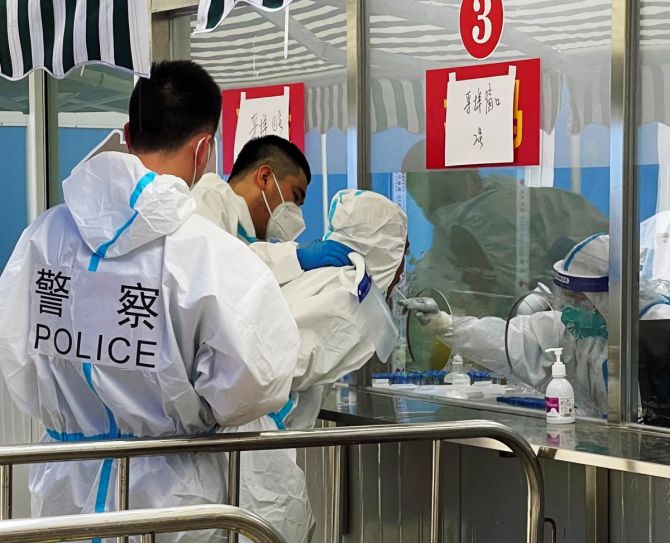
Earlier this year, you told me you will be free after 60 days of confinement. Then, within three days, you messaged to say you are under lockdown again.
Before I answer, I want to explain something about this city.
Shanghai is divided into two districts.
East Shanghai consists of Pudong, which is basically the financial hub and capital.
I stay in west Shanghai, known as Putuo.
The lockdown in Pudong started in March; our lockdown began on April 1.
Each lockdown was to take place in rotation and was to last not more than three weeks.
However, they were not able to control the situation. A few people in our neighbourhood decided to party on June 1 and have contracted the virus, so we are under lockdown again.
People are so angry here. In one group I wrote, 'Freedom after 60 days'. There was a lot of irate feedback. I had people telling me they have been in confinement for 70 to 80 to 90 days. Eventually, I had to apologise and delete my post.

What was the initial 60-day lockdown like? Can you explain it to people who don't know what's going on in China?
On June 1, everybody stepped out to look around, meet friends and family and to party.
A good friend of mine, who is a tailor and was in lockdown since March 10, visited his shop. Obviously, there were no customers. But, within minutes, he received a call saying there was a fresh lockdown.
There are a lot of bars, pubs and restaurants near his shop.
Now, both the neighbourhoods -- where his home is and where his shop is located respectively -- are shut down.
Thankfully, he has a bike so he raced home before he got locked inside his shop.
I have been at home since April 1. We all went out on June 1 and June 2. Then, we were told we could not go out anymore.
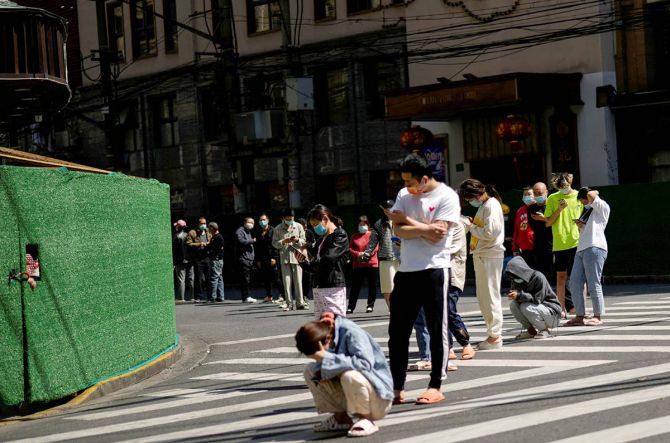
Can you tell us what the first 60-day lockdown was like?
The morning begins with the daily antigen and PCR tests.
The first one can be done at home. The PCR is provided by the society and the government; that's the most important test.
These are done building wise and it starts from the highest floor. When they reach your floor, an announcement is made on the intercom. As a result, there is no physical queue for the test. There will be just four or five people waiting for the test.
You have to go outside the gate of your building; the medical personnel and neighbourhood volunteers wait for you there and conduct the test.
All of them wear white suits so you don't know who you are talking to; sometimes, they are accompanied by the police.
This usually begins around 7 am and goes on 10.30 am; you can't do anything else during this time, you just have to be around.
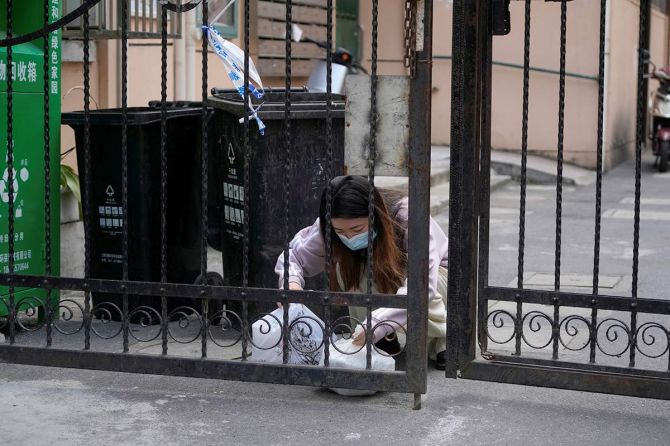
What about groceries? Since you cannot step out, how are you managing?
On June 2, before the second lockdown, I managed to get a lot of things delivered.
The first lockdown, however, was a bit of a challenge, especially during the initial days. During the first two weeks, the logistics were a disaster.
Most people have families here so it is easy for them to order in bulk. But I live alone, so it was a problem for me.
Also, there are things I don't eat and things I don't even know how to cook so, initially, it was really difficult. I survived on rice tomatoes, potatoes, eggs and onions.
Everything was horribly expensive and there was some wastage too.
Slowly, we got into a pattern that we called 'group buying'. Deliveries would take place every alternate day.
Since I am diabetic, I need to drink a lot of water. When I called for a 20 litre Bisleri can, I was told it could not be delivered because they didn't have enough staff. People advised me to drink water from the tap. Initially, I had a problem with the taste, but I survived (smiles).
I also ran out of milk in the initial days. Since I am Indian, I like to have tea with milk in the morning. Instead, I had to make do with Chinese tea.
I even ran out of turmeric. I finally got all of these in the third week.
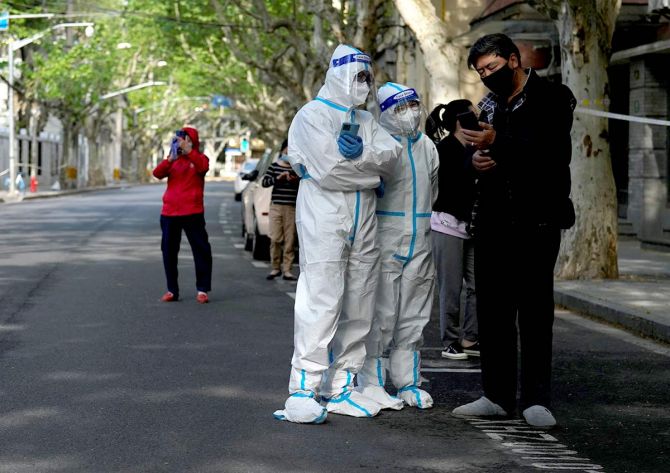
Now that the second lockdown has started, what's the situation like?
For two months everything was completely shut down, so you can imagine what the mood is like.
There were parties on every street on June 1 and now we are back in confinement.
My tailor friend is financially ruined; he has to pay the rent for his house and for his shop, but there are no customers at his shop anymore.
Dentists and many others are getting only basic pay; there are many more who are not getting paid during the lockdown.
I am more fortunate compared to a lot of people. I work from home. Besides, my office has made it a point to deliver insulin and the other medicines I need.
They have reporters with special passes to cover the city. In the mornings, these reporters buy and deliver vegetables, medicines and other essentials to staff members who cannot step out.
There were people who went hungry during the lockdown; our boss made this extra effort so that the staff is taken care of.
Does your flat have a balcony or a window from which you can see the road? Do people step out during the lockdown?
Yes, I have a balcony on one side and a window; the latter was my window to the world.
Initially, I only saw people in blue and white suits -- the official health workers who went around neighbourhoods conducting tests on a daily basis.
After the third week, I saw a few logistics people who went around on bikes and cycles delivering stuff.
Otherwise, the roads were clear.
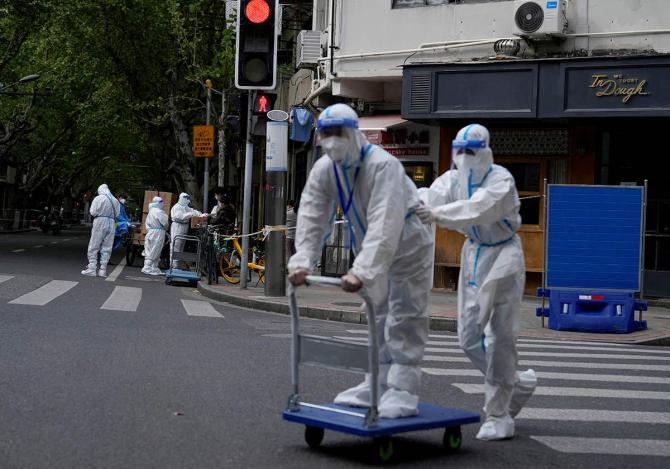
How did your day begin and end during the first lockdown?
In both lockdowns, my day begins with an early wake-up call from the building people.
I do the antigen test. If it is clear, I go down once I get the call for the PCR test.
In the afternoon, I do another antigen test.
In fact, during the first lockdown (April-May), health volunteers would come at around 2.30 am. They would bang our doors to awaken us and do the scan.
The Chinese have to upload their details and scanned identity cards on an app for the swab test. We expats have to upload our scanned passports. Initially, there was a problem because our passports are alphanumeric and the app would only accept digits. Then, it was sorted.
After the second lockdown started, on the very first day, I faced the same problem on the app again.
But now I know what needs to be changed and how it is to be done; I explained that to the volunteers and requested them to make the changes so that I could upload my scanned passport.
Every day, I have to get up an hour before the antigen test. Then, we wait because we cannot proceed for the PCR test until we get clearance.
When I come back home, I have a cup of tea, sleep for an hour and then work till 7.30 pm.
One of the most difficult challenges during the initial days of the first lockdown was cooking food.
I would make breakfast, work, take a break to cook lunch, work and end the day with cooking dinner.
My entire day goes in cooking, working and washing my clothes and utensils.
My place is a mess right now because I can only clean it once a week.
I did this for almost two months during the first lockdown and, just as I was beginning to think things were improving, we are back to confinement.
Overall, though, I am lucky. When a young Indian family who had recently moved into my locality found out that I live here, the lady volunteered to send food; she said that since she was going to cook for three people anyway, she had no problem cooking for me as well.
Getting hold of disposable containers was a quite a task, but she managed it. She also arranged for a delivery guy.
Thanks to her kindness, I get one home-cooked meal every day.
Yesterday, she sent parathas and they were awesome.
It also feels good because it saves me a couple of hours that I would have to otherwise spend in the kitchen.
Cooking Indian food is a laborious task; you need to be in a good frame of mind and have lots of patience.
Knowing you are getting home-cooked food makes you feel relaxed; I can focus on my work.
Feature Presentation: Rajesh Alva/Rediff.com
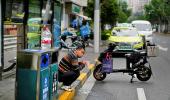


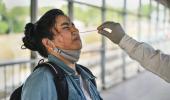







 © 2025
© 2025